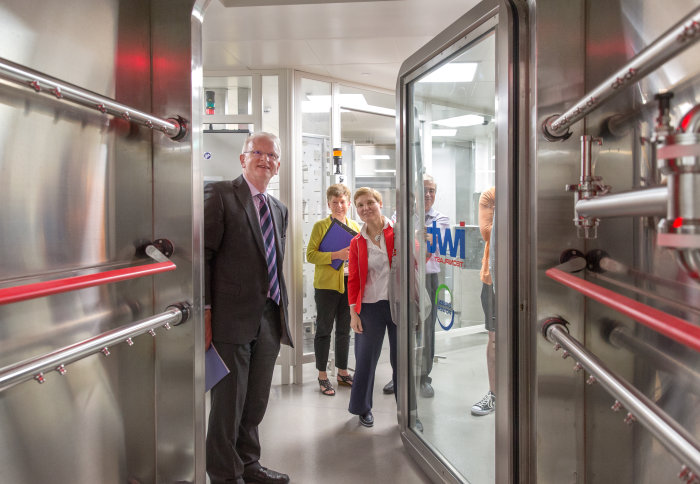Newly refurbished South Kensington animal unit opens

Newly refurbished South Kensington animal unit opens at annual celebrations of the achievements of animal research.
Staff involved in animal research gathered yesterday to celebrate the excellence of Imperial College London in animal research and the application of the 3Rs (reduce, refine, replace).
This year the highlight of the celebrations, held in the Sir Alexander Fleming Building, was the opening ceremony for the newly refurbished South Kensington animal facility.
After a year-long refurbishment, the South Kensington Central Biomedical Services (CBS) facility is finally ready to re-open its doors to Imperial’s researchers and technicians.
Speaking at the event Professor James Stirling, Provost and Establishment Licence Holder, recalled all the achievements of animal research at Imperial on its long journey. He said the new facility with its advanced equipment was a reflection of the high quality standards that made Imperial College CBS department stand out.
Emotions ran high for all those involved in the makeover of the 20-year old facility during Professor Stirling’s speech and the ribbon cutting at the entrance to the new unit.
The ceremony was then followed by walking tours of the unit, a unique opportunity for everyone attending to have a look at the new fully equipped rooms and modern cage-washing robot system.

Celebrating the science and the welfare
At the showcase event some of Imperial’s top researchers presented examples of innovative ways to apply the principles of the 3Rs to their research areas. Dr Aubrey Cunnington explained how a critical approach to the current literature looking at animal models with severe malaria was fundamental to pointing his studies in the right direction. His contribution was followed by Dr Susanne Sattler, who illustrated her innovative ideas for refining the current approach to recreating myocardial infarction in mice.
Talking about her studies on haematopoiesis, Dr Cristina Lo Celso, recently awarded the prestigious Foulkes Foundation Medal, said: “Although animal work remains necessary, we can learn from in vivo studies how to improve our in vitro system and continue to refine and replace the current animal models.”
The session ended with a keynote lecture from Professor Esther Rodriguez Villegas, who presented her NC3Rs Crackt-it challenge winner TaiNi device, which has the potential to revolutionise the neurophysiology research field, whilst improving animal welfare.
More examples of the innovative applications of the 3Rs from around the College and the commitment of Imperial researchers and staff towards the application of the 3Rs in animal research are described in the fourth edition of the Annual Report, launched during the event.
A special award
Towards the end of the afternoon, Professor Stirling awarded prizes for excellence in animal research to the winners of the four categories (researchers, staff from CBS, team, and communications) of the Provost’s Prize for excellence in animal research, praising all of this year's winners for their achievements.
The prizes not only recognise the essential contribution of staff to advancing the College’s mission to be ‘best in class’ for animal research, but also enable the winners to disseminate their work to a wider audience, an essential part of Imperial's commitment under the Concordat on Openness on Animal Research. The details of this year's winners and their projects are in the 2018 edition of the annual report.
This year's event was also the occasion to bid farewell to Professor Stirling in light of his forthcoming retirement. Professor Marina Botto, Director of Bioservices, Professor Richard Reynolds, Chair of the 3Rs Advisory Group, and Professor Sian Harding, chair of the Central Animal Welfare and Ethical Review Body (AWERB), on behalf of the College, awarded Professor Stirling a special certificate as a sign of gratitude for his commitment towards animal research.
He said: “This is a totally unexpected prize and I really appreciate it. We have achieved a lot in term of 3Rs, transparency, communication and openness, going through difficult situations to be now acknowledged as an example institution. This was realized thanks to the effort of all the people that have gathered together and worked together to reach the highest standard in animal research.”
CBS staff are planning to start receiving animals in the South Kensington Unit sometime in September. Once the facility is fully operational interested parties will be able to tour the facility.
Article text (excluding photos or graphics) © Imperial College London.
Photos and graphics subject to third party copyright used with permission or © Imperial College London.
Reporter
Press Office
Communications and Public Affairs
- Email: press.office@imperial.ac.uk
